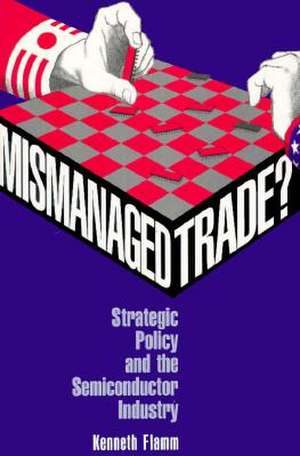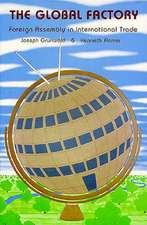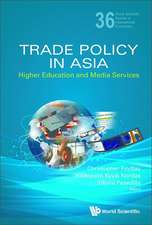Mismanaged Trade?: Strategic Policy and the Semiconductor Industry
Autor Kenneth Flammen Limba Engleză Paperback – iun 1996
The semiconductor industry is at the forefront of current tensions over international trade and investment in high technology industries. This book traces the struggle between U.S. and Japanese semiconductor producers from its origins in the 1950s to the novel experiment with "managed trade" embodied in the U.S.-Japan Semiconductor Trade Arrangements of 1986, and the current debate over continuation of elements of that agreement. Flamm provides a thorough analysis of this experiment and its consequences for U.S. semiconductor producers and users, and presents extensive discussion of patterns of competition within the semiconductor industry. Using a wealth of new data, he argues that a fundamentally new trade regime for high technology industries is needed to escape from the present impasse. He lays out the alternatives, from laissez-faire to managed trade, and argues strongly for a new set of international ground rules to regulate acceptable behavior by government and firms in high-tech industries.
Flamm's detailed analysis of competition within the semiconductor industry will be of great value to those interested in the industrial organization of high-technology industries, as well as those concerned with trade and technology policy, international competition, and Japanese industrial policies.
Flamm's detailed analysis of competition within the semiconductor industry will be of great value to those interested in the industrial organization of high-technology industries, as well as those concerned with trade and technology policy, international competition, and Japanese industrial policies.
Preț: 256.84 lei
Nou
Puncte Express: 385
Preț estimativ în valută:
49.15€ • 51.31$ • 40.67£
49.15€ • 51.31$ • 40.67£
Carte tipărită la comandă
Livrare economică 04-18 aprilie
Preluare comenzi: 021 569.72.76
Specificații
ISBN-13: 9780815728474
ISBN-10: 0815728476
Pagini: 489
Dimensiuni: 152 x 229 x 34 mm
Greutate: 0.66 kg
Ediția:New.
Editura: Brookings Institution Press
Colecția Brookings Institution Press
ISBN-10: 0815728476
Pagini: 489
Dimensiuni: 152 x 229 x 34 mm
Greutate: 0.66 kg
Ediția:New.
Editura: Brookings Institution Press
Colecția Brookings Institution Press
Notă biografică
Kenneth Flamm is a senior fellow in Economic Studies and Foreign Policy Studies at the Brookings Institution.
Descriere
The semiconductor industry is at the forefront of current tensions over international trade and investment in high technology industries. This book traces the struggle between U.S. and Japanese semiconductor producers from its origins in the 1950s to the novel experiment with "managed trade" embodied in the U.S.-Japan Semiconductor Trade Arrangements of 1986, and the current debate over continuation of elements of that agreement. Flamm provides a thorough analysis of this experiment and its consequences for U.S. semiconductor producers and users, and presents extensive discussion of patterns of competition within the semiconductor industry. Using a wealth of new data, he argues that a fundamentally new trade regime for high technology industries is needed to escape from the present impasse. He lays out the alternatives, from laissez-faire to managed trade, and argues strongly for a new set of international ground rules to regulate acceptable behavior by government and firms in high-tech industries.
Flamm's detailed analysis of competition within the semiconductor industry will be of great value to those interested in the industrial organization of high-technology industries, as well as those concerned with trade and technology policy, international competition, and Japanese industrial policies.
Flamm's detailed analysis of competition within the semiconductor industry will be of great value to those interested in the industrial organization of high-technology industries, as well as those concerned with trade and technology policy, international competition, and Japanese industrial policies.


















